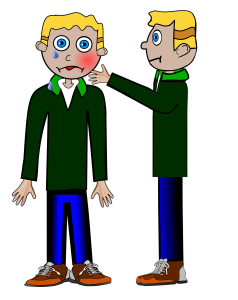Snap Out of It!
What Do You Tell Your Clients When They’re Feeling Sorry for Themselves?
The Way I Hear It
Gael Hannan (The Way I Hear It) is a hard of hearing advocate that understands both sides of the fence between the consumer and the hearing health care professional. Gael’s columns are humorous, sometimes cutting, but always constructive and to the point.
 Recently, I had to give myself a slap in the face. The kind of “snap out of it” slap-a-thon that Cher gave to Nicolas Cage in “Moonstruck” when he was acting dopey-lovestruck, – although not quite so hard.
Recently, I had to give myself a slap in the face. The kind of “snap out of it” slap-a-thon that Cher gave to Nicolas Cage in “Moonstruck” when he was acting dopey-lovestruck, – although not quite so hard.
I was feeling a bit sorry for myself, having tinnitus and hearing loss and all. Poor me. Why me? I always get the short straw! Couldn’t I have a different problem!? Rosacea, maybe?
That’s when I slap-slapped myself.
First off, I’m sure people with rosacea would also rather have a different issue. Secondly, didn’t I realize how lucky I am? Relatively speaking, that is, compared to other conditions or diseases?
- I’m not in pain.
- I’m not itchy.
- I don’t have to stay within sprinting distance of a bathroom.
- I can afford hearing aids and other assistive technology, and I have access to knowledgeable and creative hearing health professionals.
- Not everyone can.
What about people whose knees turn to jelly at the price tag on hearing aids? If they feel they can’t afford it, they might go without hearing aids, or save up for them. You save up for vacations, not important medical supports.
Hearing loss still doesn’t get the respect it deserves as a crucial health issue that affects quality of life.
If I went running into the ER yelling, “I’ve lost all feeling in my left hand!” or ‘I’ve lost my mind!”’, the hospital staff would jump into action (when it was my turn to be seen, of course) to fix the problem. Sure, I might have to pay for some medicine, or therapy or counselling, but if I were a hearing person running into the ER screaming, “I can’t hear, I can’t HEAR!”, I would be assessed, maybe prescribed some antibiotics for sudden deafness, and referred to an otolaryngologist (ENT). But if it were recommended that I get a hearing aid (or two) so that I can hear, in many areas of the country, continent and universe, I’d be on my own to pay for them. (And it makes me even madder to realize many people don’t have coverage for antibiotics, either.)
We’ve made amazing advancements in hearing health care and even in the area of affordability. Still the problem persists, and we must all continue to advocate for more accessible health care because cost and the perceived value of hearing aids are the main deterrents for individuals.
That rant aside, living with hearing loss – even with hearing aids and supportive family and friends – can get you down. I’ve always allowed myself one bad-mood-hearing-day a year – sometimes more frequently. And it’s allowed. People always admire the smiling, brave outer face of people living with disabilities, because they don’t see the private tears, the ongoing moments of struggle, fatigue, and frustration that get to us.
But after our little self-pity party, we need to shake it off and go back to putting one foot in front of the other, which is the only way to move forward. We just need some help, along with the occasional self-slap or even better, an I-Love-Me moment.
Clinicians, how do you help your clients with this issue?
This article by Gael Hannan has been modified from its original posting in HearingHealthMatters.org, with permission.

